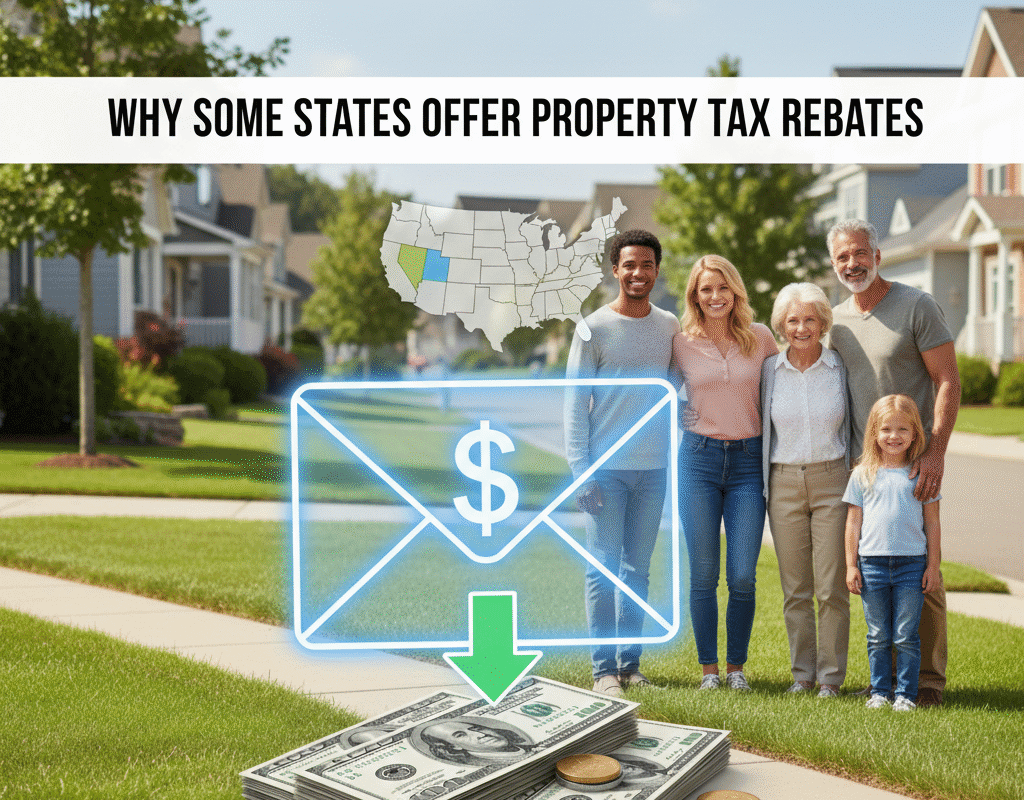Why Some States Offer Property Tax Rebates?
Why Some States Offer Property Tax Rebates?
For homeowners in the US, property taxes continue to be one of their biggest financial responsibilities. Even while these taxes pay for vital public services like roads, schools, and emergency services, the burden can be significant, especially for elderly people, low-income families, and residents of expensive neighborhoods.
Some governments provide property tax rebates to alleviate this load, which improves affordability and offers financial assistance to qualified homeowners. But who gains the most from these refunds, and why do states offer them?
HSBC Cashback Credit Card 2025 – Benefits, Rewards & How to Apply?

Comprehending Property Tax Rebates
A program known as a property tax rebate allows a state or local government to reimburse eligible homeowners for a portion of their property taxes.
Rebates offer direct financial compensation, in contrast to normal deductions or exemptions that lower the value of taxable property. Depending on the state’s fiscal priorities and policy objectives, these programs differ greatly in terms of structure, eligibility, and payment mechanisms.
Refunds for property taxes are frequently intended to:
- Assist vulnerable groups, including low-income households, veterans, and the elderly.
- Make homeownership more accessible to promote it.
- Put money back into the hands of locals to boost their economies.
- Reduce increases in property tax rates brought on either inflation or growing property values.
How Property Tax Rebates Work
The mechanics of property tax rebates vary by state. Generally, they involve the following steps:
- Eligibility Determination: States define eligibility based on income, age, disability status, or property ownership. For instance, seniors over 65 or disabled residents often qualify for higher rebates.
- Application Process: Eligible homeowners must submit applications with proof of property taxes paid, income documentation, and identification. Some states automatically enroll homeowners who meet criteria.
- Calculation of Rebate: Rebates may be a fixed amount, a percentage of property taxes paid, or a sliding scale based on income.
- Payment of Rebate: Rebates can be issued as direct checks, credits against future property taxes, or adjustments on annual tax bills.
States That Offer Property Tax Rebates
Property tax rebates or comparable assistance programs are offered by a number of states in the United States:
- New York: Offers the STAR (School Tax Relief) program, which provides rebates to homeowners based on the value of their property and income level.
- California: Provides the Property Tax Postponement Program for seniors and disabled homeowners, effectively reducing immediate tax burdens.
- Texas: Offers exemptions and limited rebates for veterans, seniors, and disabled individuals.
- Pennsylvania: Runs a Property Tax/Rent Rebate Program to refund eligible residents based on income and property taxes paid.
- Each state tailors its rebate program to meet local needs, fiscal capacity, and policy priorities.
Eligibility Criteria and Considerations
Eligibility for property tax rebates varies but generally includes:
- Age: Many programs target seniors, often 65 and older.
- Income Level: Low to moderate-income households are frequently prioritized.
- Disability Status: Disabled residents may qualify for full or partial rebates.
- Property Ownership: Only primary residences are typically eligible; investment properties and second homes are excluded.
Homeowners should carefully review state guidelines to determine if they qualify. Failing to apply for a rebate could mean missing out on significant financial relief.
Advantages That Go Beyond Monetary Relief
Property tax rebates have other benefits in addition to their primary purpose of lowering financial burden:
- Improved Homeownership Retention: Rebates can prevent foreclosures or forced sales due to unaffordable taxes.
- Enhanced Quality of Life: Reducing tax stress allows homeowners to allocate resources toward healthcare, home improvements, or daily living expenses.
- Encouragement for Civic Participation: Programs often require homeowners to engage with local government systems, increasing awareness and participation in civic processes.
Obstacles and Reactions
Despite their benefits, property tax rebates face criticism and challenges:
- Budget Constraints: Rebates can strain state budgets, particularly during economic downturns. Some states must limit the number of recipients or reduce the rebate amount.
- Complex Application Processes: Homeowners may struggle with paperwork, deadlines, and eligibility verification.
- Limited Reach: Not all residents qualify, and high-income homeowners may be excluded despite rising property taxes.
Policymakers must balance the desire to provide relief with the need to maintain funding for public services.
How Homeowners Can Maximize Benefits
To fully benefit from property tax rebates, homeowners should:
- Stay Informed: Regularly check state websites or local tax offices for program updates.
- Maintain Accurate Records: Keep documentation of property tax payments and income statements.
- Apply Early: Some programs have limited funds and strict deadlines.
- Seek Professional Advice: Tax professionals or local advisors can provide guidance on eligibility and maximize rebates.
In conclusion: Why Some States Offer Property Tax Rebates?
Property tax rebates are an essential tool for states to support homeowners, promote equity, and stimulate local economies. While they vary widely across the U.S., these programs consistently aim to reduce financial stress, especially for seniors and low-income households. By understanding eligibility, application processes, and the broader benefits, homeowners can take advantage of these rebates and secure meaningful financial relief.
As property values and living costs continue to rise, state-level property tax rebates will likely remain a critical component of American fiscal policy, helping to ensure that homeownership remains attainable and sustainable for all.
The Future of Cash Deposit Machines in the U.S.: Innovation, Challenges & What’s Next
The Future of Cash Deposit Machines in the U.S.: Innovation, Challenges & What’s Next
